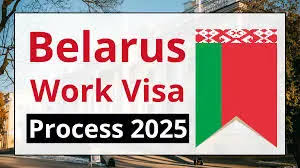How to Get a Belarus Work Visa in 2025: Complete Step-by-Step Guide
Are you considering working in Belarus in 2025? With its growing industries, affordable living, and central location in Eastern Europe, Belarus is becoming an attractive destination for foreign professionals. This guide will walk you through how to get a Belarus work visa in 2025, including requirements, the application process, and expert tips for a successful outcome.
In 2025, Why Work in Belarus?
In industries like IT, engineering, manufacturing, and healthcare, Belarus is gradually expanding its employment market to include highly qualified foreign workers. In order to meet local labor demands, the government is encouraging foreign talent, which will make it simpler to get a Belarus work permit and visa in 2025.
Types of Work Visas in Belarus
There are mainly two types of visas for employment:
-
Type B Visa (Short-Term Work Visa)
Valid for up to 90 days for short-term work or business assignments. -
Type D Visa (Long-Term Work Visa)
Issued for long-term employment and allows multiple entries, valid up to 1 year.
Belarus Work Visa Requirements (2025)
To apply for a Belarus work visa, you will need:
-
A valid passport (at least 6 months validity)
-
Completed visa application form
-
Passport-sized photos (as per Belarus visa photo specifications)
-
Employment contract or job offer from a registered Belarusian employer
-
Work permit (issued by the Department of Citizenship and Migration of Belarus)
-
Medical certificate and proof of HIV-negative status
-
Proof of accommodation in Belarus
-
Visa fee payment receipt
Step-by-Step Guide: How to Apply for a Belarus Work Visa in 2025
Step 1: Get a Job Offer
Secure a legitimate job offer from a Belarus-based employer. This is the first requirement for obtaining a work permit.
Step 2: Employer Applies for Work Permit
Your employer must apply for a work permit on your behalf through the local migration department. This typically takes 15–30 business days.
Step 3: Gather Required Documents
Once your work permit is approved, gather all supporting documents for the visa application.
Step 4: Submit Your Visa Application
Apply for the work visa at the Belarusian embassy or consulate in your country or online if available. Submit all required documents and attend an interview (if needed).
Step 5: Wait for Processing
Visa processing usually takes 5–10 business days, but it may vary depending on your nationality and embassy workload.
Step 6: Travel to Belarus
After receiving your visa, you can legally enter Belarus and begin working under the terms of your employment contract.
Work Visa Fees in 2025
Visa fees may vary by country, but the average costs are:
-
Short-Term (Type B) Visa: ~$60 USD
-
Long-Term (Type D) Visa: ~$90–$120 USD
Check with your nearest Belarusian consulate for the exact fee in your location.
Important Tips for a Smooth Process
-
Double-check all documents before submission.
-
Apply early—visa processing can take longer during busy periods.
-
Make sure your employer is legally registered in Belarus.
-
Maintain copies of all submitted documents and correspondence.
-
Learn some basic Russian or Belarusian to ease communication.
Can You Extend a Belarus Work Visa?
Yes. A work visa can be extended or converted into a residence permit if your employment continues. Your employer must apply for the extension before your visa expires.
Questions and Answers (FAQs)
Q: If I have a Belarus work visa, can I bring my family?
A: After your work visa is granted, your family may apply for dependent visas.
How long does it take to obtain a Belarusian work visa?
A: 2–4 weeks on average, depending on how thorough your application is and how busy the embassy is.
Is it simple to locate jobs in Belarus that speak English?
A: The majority of jobs require Russian, although the need for English-speaking workers in the IT and educational sectors is rising.
